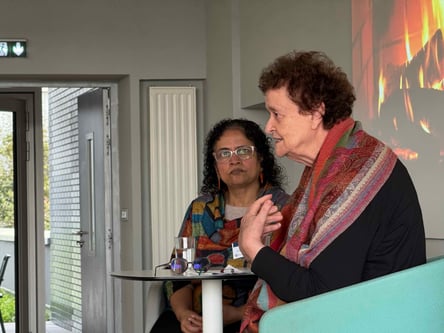Effectuation 2024 - Nantes - Recap
This year, I attended the Effectuation Conference 2024 in Nantes, France. I am a beginner and I wanted to learn more about effectuation, as I teach design thinking, Entrepreneurship and Innovation.
So, in a nutshell, effectuation is a concept in entrepreneurship that “describes an approach to making decisions and performing actions in entrepreneurship processes, where you identify the next, best step by assessing the resources available in order to achieve your goals, while continuously balancing these goals with your resources and actions.
Effectuation differs from the causal logic, where there is a predetermined goal and the process to achieve it is carefully planned in accordance to a set of given resources. Sarasvathy argues that the causal logic is not suited for entrepreneurship processes that are inherently characterized by uncertainties and risks.” (Saras Sarasvathy quoted by University of Copenhaguen on the following URL https://innovationenglish.sites.ku.dk/model/sarasvathy-effectuation/). 
After this short introduction, you are ready to discover what happened at the conference! The event conference started with a presentation from Saras Sarasvathy who presented her research on the CAVE framework (Causal, Adaptive, Visionary and Effectual). This quadrant describes how expert entrepreneurs make decisions in highly uncertain situations. Do not hesitate to read Sarasvathy’s research on the CAVE framework, you will learn so much about the different entrepreneurs’ journeys possibilities.
Following this presentation, we had a presentation by Slavica Singer, who encouraged the audience to use effectuation to redesign the university toward education as a shared undertaking. For example, she proposed to design and implement creative destruction to open new ways of organizing knowledge and pedagogy.
Then we were whisked out to our Pods (or teams to work on our effectuation projects). I was in the practice Pod. Each people (or group of peoples) presented their effectuation practice. We had the opportunity to learn about:
- 1 exercise to help PhD students experiment effectuation,
- the use of Lego Serious Play to explore the Effectuation canvas,
- An AI prototype to make people more familiar with effectuation,
- A metaphor framework to help corporates understand the CAVE framework.
- An exercise destined to educators to become more effectual.
- An integrative approach to teach how to identify business opportunities in a Bachelor program.
- A boardgame to help your startup idea grow.
- A co-creation project research on the reasons why effectuation is difficult to stick in organizations.
Then we had challenge to prepare, which was to prepare and do a podcast presenting our Pods’ findings and insights.
The evening, there was no rest for the effectuation warriors that we are. We were led to a cooking school, where we were divided in teams and we were told to cook for 60 people (a.k.a us). We were provided ingredients, but no recipe and we (the effectuation professors or researchers or practitioners) were supposed to cook. Some fights and negotiations occurred around ingredients.  And each time we thought we were going to succeed, a new obstacle happened (like in the entrepreneurial journey). After 30 minutes, the cooking team removed 1 members of each team and exchange them. Thirty minutes later, an evil secret ingredient was imposed to each team (wasabi, or red pepper purée, stinky maroille cheese, or matcha green tea powder). Finally, one hour before the deadline, we were told that actually we were supposed to serve the food 30 minutes earlier than planned. We all were able to serve the food on time. No one got poisoned. And the food was even good.
And each time we thought we were going to succeed, a new obstacle happened (like in the entrepreneurial journey). After 30 minutes, the cooking team removed 1 members of each team and exchange them. Thirty minutes later, an evil secret ingredient was imposed to each team (wasabi, or red pepper purée, stinky maroille cheese, or matcha green tea powder). Finally, one hour before the deadline, we were told that actually we were supposed to serve the food 30 minutes earlier than planned. We all were able to serve the food on time. No one got poisoned. And the food was even good.

The next day was also filled with adventures. We started the morning with an analysis of our cooking adventures. Some team members were assigned the role of observers and interpreted our cooking stunt through the effectuation lens. Then, Saras Sarasvathy and Slavica Singer made an inspirational dialogue, where Slavica’s journey was presented. We learned that after the ex-Yougoslovian war she decided to set up an entrepreneurship program in Croatia and a microfinance organization from scratch, practicing effectuation (what can I do with my resources?). She advises us to use effectuation to change the system and have a positive impact. After lunch we recorded our podcasts (that we will be able to listen soon!). We ended up discussing and planning for effectuation group projects (regarding teaching, research or practice) to do during the year and to present for the Effectuation Conference in 2025.
After all these learnings, the question is, how will I be able to be effectual back at work and at home? Can’t wait to practice effectuation in the real world!
.png?width=200&height=82&name=Effectuation%20Extended%20Logo%20(200%20%C3%97%2082%20px).png)